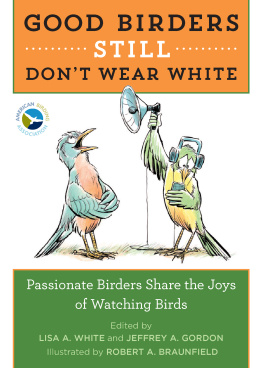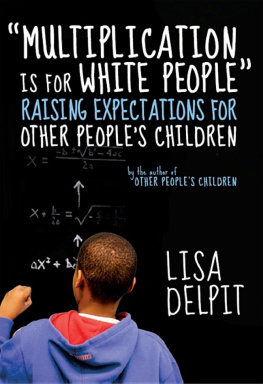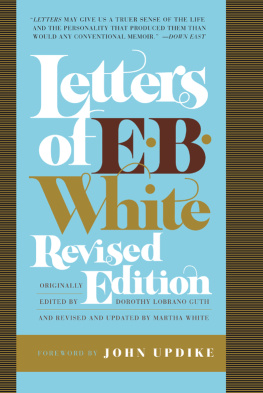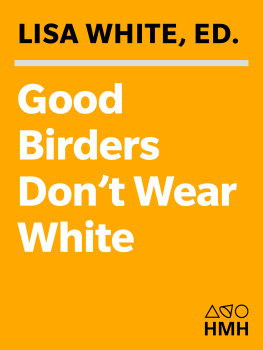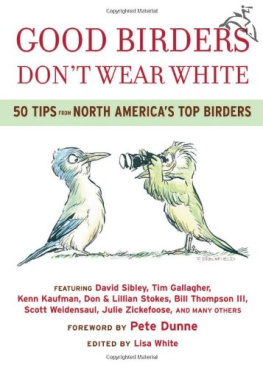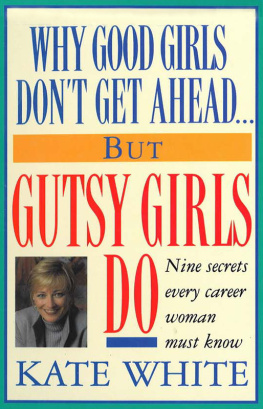Lisa White - Good Birders Still Dont Wear White
Here you can read online Lisa White - Good Birders Still Dont Wear White full text of the book (entire story) in english for free. Download pdf and epub, get meaning, cover and reviews about this ebook. publisher: Houghton Mifflin Harcourt, genre: Home and family. Description of the work, (preface) as well as reviews are available. Best literature library LitArk.com created for fans of good reading and offers a wide selection of genres:
Romance novel
Science fiction
Adventure
Detective
Science
History
Home and family
Prose
Art
Politics
Computer
Non-fiction
Religion
Business
Children
Humor
Choose a favorite category and find really read worthwhile books. Enjoy immersion in the world of imagination, feel the emotions of the characters or learn something new for yourself, make an fascinating discovery.
- Book:Good Birders Still Dont Wear White
- Author:
- Publisher:Houghton Mifflin Harcourt
- Genre:
- Rating:5 / 5
- Favourites:Add to favourites
- Your mark:
- 100
- 1
- 2
- 3
- 4
- 5
Good Birders Still Dont Wear White: summary, description and annotation
We offer to read an annotation, description, summary or preface (depends on what the author of the book "Good Birders Still Dont Wear White" wrote himself). If you haven't found the necessary information about the book — write in the comments, we will try to find it.
Good Birders Still Dont Wear White — read online for free the complete book (whole text) full work
Below is the text of the book, divided by pages. System saving the place of the last page read, allows you to conveniently read the book "Good Birders Still Dont Wear White" online for free, without having to search again every time where you left off. Put a bookmark, and you can go to the page where you finished reading at any time.
Font size:
Interval:
Bookmark:
Copyright 2017 by Houghton Mifflin Harcourt
Illustrations copyright 2017 by Robert A. Braunfield
All rights reserved
For information about permission to reproduce selections from this book, write to or to Permissions, Houghton Mifflin Harcourt Publishing Company, 3 Park Avenue, 19th Floor, New York, New York 10016.
www.hmhco.com
Library of Congress Cataloging-in-Publication Data is available.
ISBN 978-0-544-87609-5
e ISBN 978-0-544-87613-2
v1.0217
A portion of the proceeds from this book supports the conservation and community programs of the American Birding Association, North Americas leading membership organization for active birders.
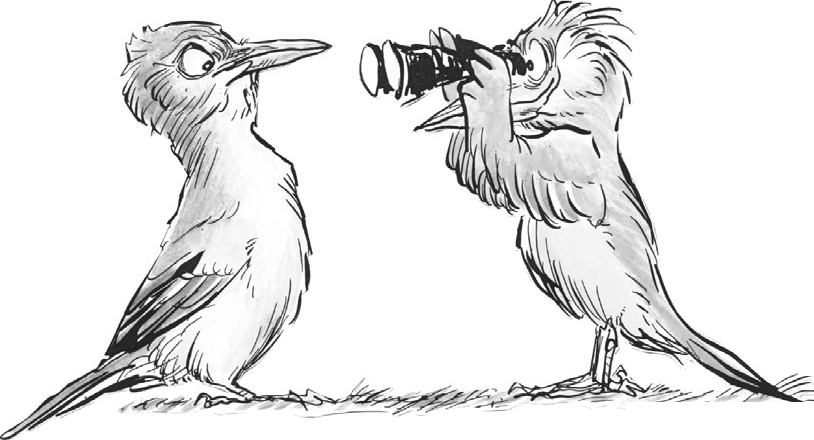
Like birds?
We can help with that!
The American Birding Association is dedicated to making birding better for all. We invite you to come explore the wealth of useful, fun, and free resources we offer to all birders, as well as the many additional benefits of ABA membership.
Go to aba.org/goodbirders and get started today.
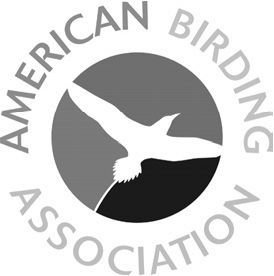

by Jeffrey A. Gordon
Im going to look for a yellow-headed blackbird. The speaker was thirteen-year-old me, having begun really paying attention to birds only a year or so before. Now, forty years later, Im still amazed and even a little embarrassed at what a brash declaration this really was. To the adults present when I said it, Im certain it sounded utterly ridiculous, but they were too kind to say so. Really, there was no need. Experience would teach me, as it had taught them. But experience had a very different lesson planned for that morning.
It was September, and members of the Delmarva Ornithological Society had gathered for a field trip to Dragon Run Marsh near Delaware City, Delaware. I was not only by far the youngest and most unseasoned person in the group, I was armed. Armed with a brand-new spotting scope, a powerful instrument that my mentor wryly cautioned would merely allow me to misidentify birds that were farther away, if I wasnt careful. So when I saw a flock of several dozen blackbirds, mostly red-winged, leapfrogging through the cattails that lined the distant shore of the impoundment where we were birding, I immediately set about deploying my shiny new weaponry to inspect them.
There was nothing unusual in any of this. Birders commonly sift through flocks, sometimes very large flocks, be they blackbirds, gulls, shorebirds, geesealmost any concentration of birdsin large part because they hope to find something different, maybe something rare. There wasnt even anything too crazy in having a fleeting microfantasy that those red-wings might have a far out-of-place yellow-headeda spectacular western species that Id seen only in picturesamong them. We all have thousands of improbable thoughts, notions, dreams, and fragments thereof that pass through our minds more or less constantly. Surely that knife blade isnt as sharp as they say it is. I can jump that. I dont see any cops aroundlets go for it!
Those of us who wish to avoid embarrassment, injury, and/or incarceration wisely let these little thoughtlets pass unremarked and certainly unacted upon. What was nuts was not that I thought that day about finding a yellow-headed blackbird. It was that I opened my mouth and said so loudly and with a complete lack of sarcasm. Its not unlike announcing on the tee that one is about to sink a hole in one, no big deal, and does anybody want to bet a hundred bucks that I wont? Sure, everyone has those few milliseconds when that exact idea flashes across your mind. But say so out loud and in earnest and you will quickly lose all your credibility, your money, and any future golfing invitations, in that order.
Aware of those stakes as I wasand despite their reputation for recklessness, teenagers are keenly aware of any risk of shame or disgraceI still went ahead and blurted out my avian intentions for all to hear.
And the birding gods, instead of laughing at me, decided to honor my petition. Perhaps the fourth or fifth bird that I looked at was none other than a yellow-headed blackbird. And not just a brownish juvenile with a mustard stain across its throat, but a searingly gorgeous adult male, resplendent and perfect.
I found one. A yellow-headed blackbird! I said. A dozen heads whipped around, and a dozen faces stared at me agog.
At that point, things could have really gone south. I could have announced my find, only to have the bird drop from view into the vegetation, never to be refound. But instead my incredible good fortune held, and the bird stayed put, granting everyone in the group the chance to take their turn at the scope and to marvel at his incandescence. Then he flew off, leaving those birder heads and faces beaming and shaking in wonder and disbelief.
I wish I could say that that was the day I discovered I had superpowers, an ability to summon birds out of thin air merely by speaking their names. Alas, no. In the thousands of mornings afield that have followed, I have learned, as my adult companions that day already knew, that rare birds really are pretty rare, and that big talk will make you a fool far more often than it will make you a hero.
But that day did teach me a number of really key things. Most crucially, it showed me that I, barely out of elementary school, had found a community in which I could make a positive and valued contribution. I could do things that surprised and delighted peoplethat made them feel happy and grateful. Thats an all too rare feeling for most of us, even as adults. For me, as a struggling, often awkward adolescent, it was transformative.
Of course, it wasnt just a lucky prediction about a rare blackbird that made that transformation happen, though that certainly serves as a lovely and memorable signpost. It was discovering that birders as a tribe functioned in ways that were different and in most ways superior to the Lord of the Flies world of junior high school that was then my day-to-day reality.
For starters, birders were smart and curious. They liked solving puzzles and having command of a large number of facts. They paid attention to the natural world and its daily, seasonal, and annual cycles. They knew geography at an unusual level of detail, regularly visiting places that few knew existed. Birds, the objects of their passion, were real and nearly omnipresent, yet seemed to belong to another world, one full of color and flight and mystery and the raw drama of survival.
I think that even more than all these, what really drew me into the community was that birders had a code. A code of honor and conduct and ethics that, while largely unwritten, was known and for the most part closely observed by all. It emphasized being open to all: what you looked like, how much money you had, or what your job title wasindeed, most traditional markers of statuswere far less important than your interest and ability in finding and identifying birds.
An even more important value involved being honest and reliable. In birding, you are as good as your word. If youre not sure that you saw a certain bird, youre expected to say so. Well-intentioned mistakes are forgiven, even valued as learning opportunities, as long as they are openly admitted. But dishonesty will get you shunned, fast.
Next pageFont size:
Interval:
Bookmark:
Similar books «Good Birders Still Dont Wear White»
Look at similar books to Good Birders Still Dont Wear White. We have selected literature similar in name and meaning in the hope of providing readers with more options to find new, interesting, not yet read works.
Discussion, reviews of the book Good Birders Still Dont Wear White and just readers' own opinions. Leave your comments, write what you think about the work, its meaning or the main characters. Specify what exactly you liked and what you didn't like, and why you think so.

